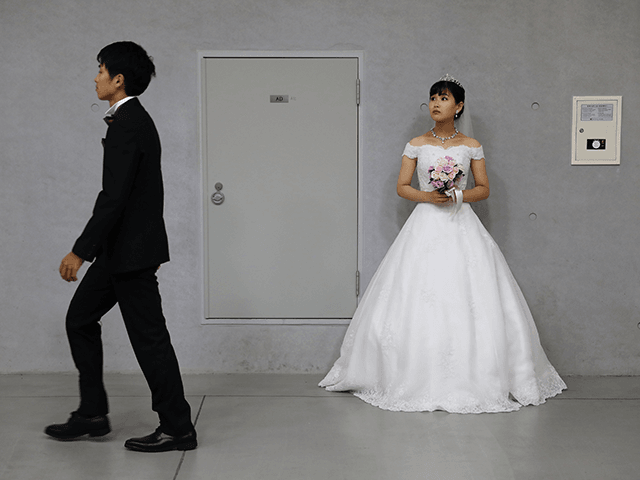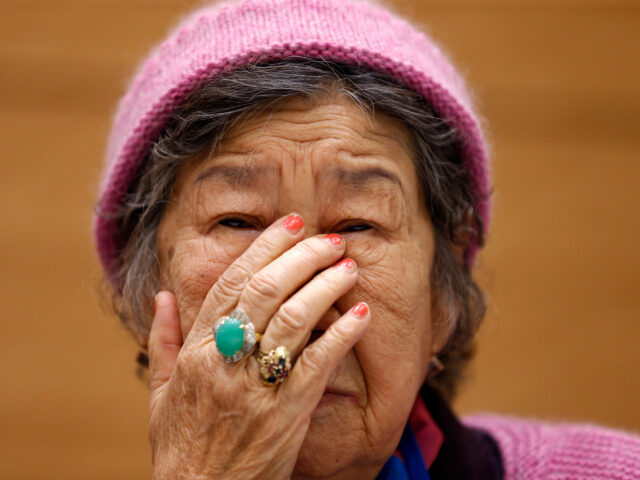A coffee shop in South Korea has gone viral on the Internet this week after a local shared a photo of its door with the label “No-senior zone (no entry for elderly over 60).”
The Korean newspaper Chosun Ilbo reported on Thursday that the cafe made the move in response to older men who allegedly sexually harass its customers.
The image prompted widespread outrage, as many social media users complained that senior citizens had the same rights as other Koreans and that anti-discrimination laws should prevent businesses from banning potential customers based on age. The “no-senior zone” surfaced following the emergence of a growing, and far less controversial, trend of Korean businesses and public spaces, including libraries, branding themselves “no-kid zones,” preventing minors from accessing them for the convenience of the adults present.
South Korea has the world’s lowest fertility rate and is expected to lose over half its population by the year 2100.
The Korea Herald, which reported on the “no-senior zone” controversy on Tuesday, did not name the cafe in question, noting that the photo going viral showed only the front door’s labels. The “no-senior zone” sign appears alongside an image that indicates dogs are welcome, adding to the anger against the business.
According to the Herald, the original post showing the cafe included a comment from the presumed photographer, reading, “I do not know why the owner of the cafe has decided to put up such signs, but I’m worried that my parents might see them while passing by.”
Many social media users replied with similar concerns, urging action against the alleged discrimination.
Chosun Ilbo reported on Thursday that a “netizen” who allegedly had knowledge of the business in question said it had previously welcomed elderly customers but that old men “sexually harassed women,” and it was “difficult for the boss to handle them,” causing the owner enough grief to change the door sign. The sign notably banned older women in addition to men, however.
The Kerald noted that neither “no-kid” nor “no-senior” zones have prompted any negative legal repercussions for businesses yet, but some political actors are seeking stronger anti-discrimination laws to prevent the phenomenon from growing. Chosun Ilbo noted that the South Korean Human Rights Commission had considered the possibility that “no-kid zones” were discriminatory in 2017, but no federal government in the past six years had taken any meaningful action against them. Locally, the island city of Jeju is reportedly considering an ordinance this week banning “no-kid” zones.
“The continuous emergence of ‘no-something zone’ in our society means that exclusion among groups is increasing, while efforts to understand each other are disappearing,” sociology professor Lee Min-ah at Chung-Ang University told the Korea Herald.
Last week, one lawmaker, Rep. Yong Hye-in, protested the popularity of “no-kid zones” by holding a press conference with her two-year-old in tow. Yong, of the progressive Basic Income Party, expressed concern that Korean society had become too hostile to children, citing the dramatically low birth rates in the country and that it could not progress unless it became more tolerant of the mere existence of children. She urged the country to go from being a “no-kids” society to a “kids first” one.
“We need a society that values not only speed and competence but also slowness and inexperience. To address the issue of the lowest fertility rates in the world, we must transform a culture that marginalizes both children and the elderly,” Yong said:
Journalist Hawon Jung noted that the “no-kid zones” had birthed a new, dark joke about Korean society: “South Koreans love no-kids zones so much that the whole country has become one”:
FYI, South Korea has recorded the lowest birthrates in the world for years, and the increasing prevalence of the public/private spaces enforcing the "no-kids" rule sparked a viral (and bitter) joke, "South Koreans love no-kids zones so much that the whole country has become one."
— Hawon Jung (@allyjung) May 4, 2023
South Korea logged a fertility rate of 0.81 children per mother throughout her childbearing years in 2021, the lowest in the world. To achieve “replacement” fertility, where a country can keep its population stable, scientists consider countries must maintain a rate of 2.1.
“It was the lowest since the statistics agency began compiling related data in 1970. Last year also marked the fourth straight year that the number was below 1,” Yonhap News Agency observed last year.
South Korea’s population fell for the first time in its history in 2020; fertility and marriage rates shrank in the face of severe civil restrictions after the onset of the ongoing Wuhan coronavirus pandemic. The country’s marriage rate fell to an all-time low in 2020.

A bride waiting in the queue during a wedding ceremony of the Family Federation for World Peace and Unification, commonly known as the Unification Church, at Cheongshim Peace World Center on August 27, 2018, in Gapyeong-gun, South Korea (Chung Sung-Jun/Getty Images).
Follow Frances Martel on Facebook and Twitter.

COMMENTS
Please let us know if you're having issues with commenting.